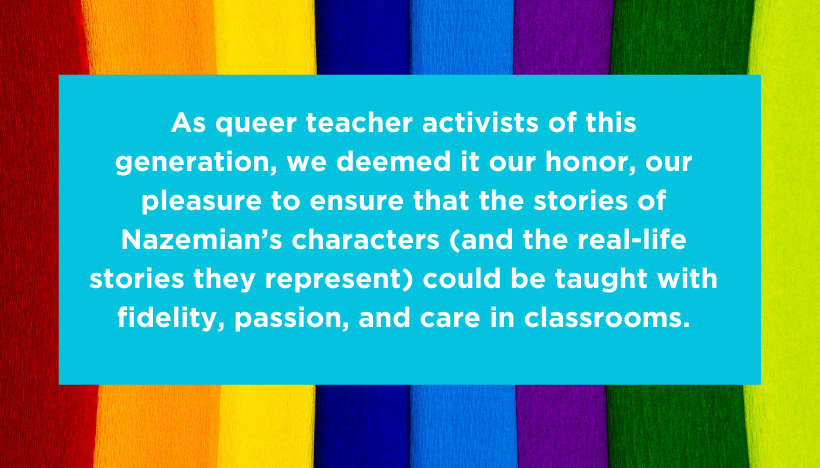From the NCTE LGBTQ Advisory Committee
This post was written by NCTE members shea martin and Cody Miller, members of the NCTE LGBTQ Advisory Committee.
I was on Boston’s Green Line when I met Abdi Nazemian’s Reza. It was just me and Reza in an empty train on a brisk March morning. Empty trains are the best for reading good books. There are no distractions—no musicians, students, loud business people, babies crying. Empty trains in dark tunnels are the holiest of tombs for words I never knew I needed. In many ways, Reza and the rest of the characters in Nazemian’s Like a Love Story provided a roadmap to what would follow. The novel, set in the 1980s New York City, follows three teenagers and their community as they love, protest, and grieve through the AIDS epidemic.
That was my last train ride before the virus came. I finished the book three weeks later in bed while frantically scrolling through the CDC website and unsuccessfully online shopping for hand sanitizer. Like our students, Reza, Art, and Judy are teenagers living through unprecedented times. Their lives are complicated by disease, family, war, sexuality, death, politics, and school. They, like our students, are grasping for any semblance of normalcy in the midst of what often feels like the end of life as we know it. The moment I closed the book, I knew it was a necessary read. Sure, it has rightfully won accolade upon accolade. But more importantly, Nazemian’s story is comfort food for today’s youth.
So I was excited to see it selected for many book lists for high school curriculum. We are always thrilled when teachers and schools seek to diversify bookshelves and disrupt the existing outdated canon. What immediately worried us, however, was thinking of the book in the hands of a field predominantly populated by white cisgender, heterosexual women. As with any good book or comfort food, we wanted to make sure we did right by Nazemian’s characters, the stories they represent, and our students.
Most teachers are a product of public school curriculum, and public school curriculum frequently refuses to place LGBTQ histories in their rightful places. While the strides made towards teaching LGBTQ history in a handful of states are promising, the reality is that most teachers do not have to have an understanding of LGBTQ history to become teachers. What teachers teach is only part of the complexities of teaching.
Young adult literature, such as Like a Love Story, can be taught in oppressive ways, whether intentional or not. For instance, including Like a Love Story without understanding the history being narrated or using stigmatizing language for people living with HIV and AIDS can enact the harm educators seek to challenge. Therefore, we wanted to provide some guidelines for teaching Like a Love Story.
Like a Love Story can act as a curricular intervention to the history perpetuated in too many history books. Abdi Nazemian reminds us that, “We learn about history in a deeper way through stories, and that’s how we get to the root of the emotion in them.” The way Nazemian illustrates how the personal is always political makes Like a Love Story an important book for English classrooms. Scholar Angel Daniel Matos argues (see the fourth essay here) that LGBTQ young adult literature that focuses on historical moments can push “readers to acknowledge a queer history that is constantly on the cusp of being forgotten” and provide readers with “opportunities to refute monolithic understandings of our culture, our history, and our place in time.” When taught thoughtfully and critically, Like a Love Story can show students how LGBTQ people fit into the pages of history.
One of the strongest themes of Nazemian’s coming-of-age tale is how the resilience and action of LGBTQ communities shaped the trajectory of our society. In the last chapter, Art recounts lessons he’s learned from the previous generation of gay activists, and considers how his own actions will fit into the broader narrative written for future LGBTQ youth:
Tell your story until it becomes woven into the fabric of our story. Write about the joys and the pain and every event and every artist who inspires you to dream. Tell your story, because if you don’t, it could be wiped out. No one tells our stories for us (Nazemian, 2019, 413)
When we read the stories of Reza, Art, Judy, Stephen, and their communities, we saw our own chosen families—families full of the love, the passion, and the commitment that are made necessary by a world that does not often welcome the nuances of our beautiful existence.
As queer teacher-activists of this generation, we deemed it our honor, our pleasure to ensure that the stories of Nazemian’s characters (and the real-life stories they represent) could be taught with fidelity, passion, and care in classrooms.
While it is never the responsibility of the oppressed to teach others, sometimes we find power in using our own understanding of history and literature to support teachers who may lack that knowledge. We are excited to announce our teacher’s guide to Like a Love Story published through HarperCollins. The guide is available for free to educators here.
Our hope is that teachers can use the guide to build critical historical consciousness with their students through the study of narrative. Young adult literature, such as Like a Love Story, when paired with justice-oriented pedagogies, can transform English classrooms into spaces that affirm LGBTQ youth by honoring the community, fights, and actions that cannot be severed from LGBTQ history.

Cody Miller is an assistant professor of English education at SUNY Brockport. During his seven years as a high school English teacher and in his current role, he positions texts as vehicles to discuss broader socio-political issues in students’ lives and worlds. Cody is chair of the NCTE LGBTQ Advisory Committee. He can be reached at hmiller@brockport.edu or on Twitter @CodyMillerELA.

shea martin is a teacher, researcher, and community organizer who dreams and works toward liberation with teachers and students across the country. shea’s work is explicitly rooted in radical love, anti-racist pedagogy, and seeking justice and liberation through intersectional coalition-building.
It is the policy of NCTE in all publications, including the Literacy & NCTE blog, to provide a forum for the open discussion of ideas concerning the content and the teaching of English and the language arts. Publicity accorded to any particular point of view does not imply endorsement by the Executive Committee, the Board of Directors, the staff, or the membership at large, except in announcements of policy, where such endorsement is clearly specified.

